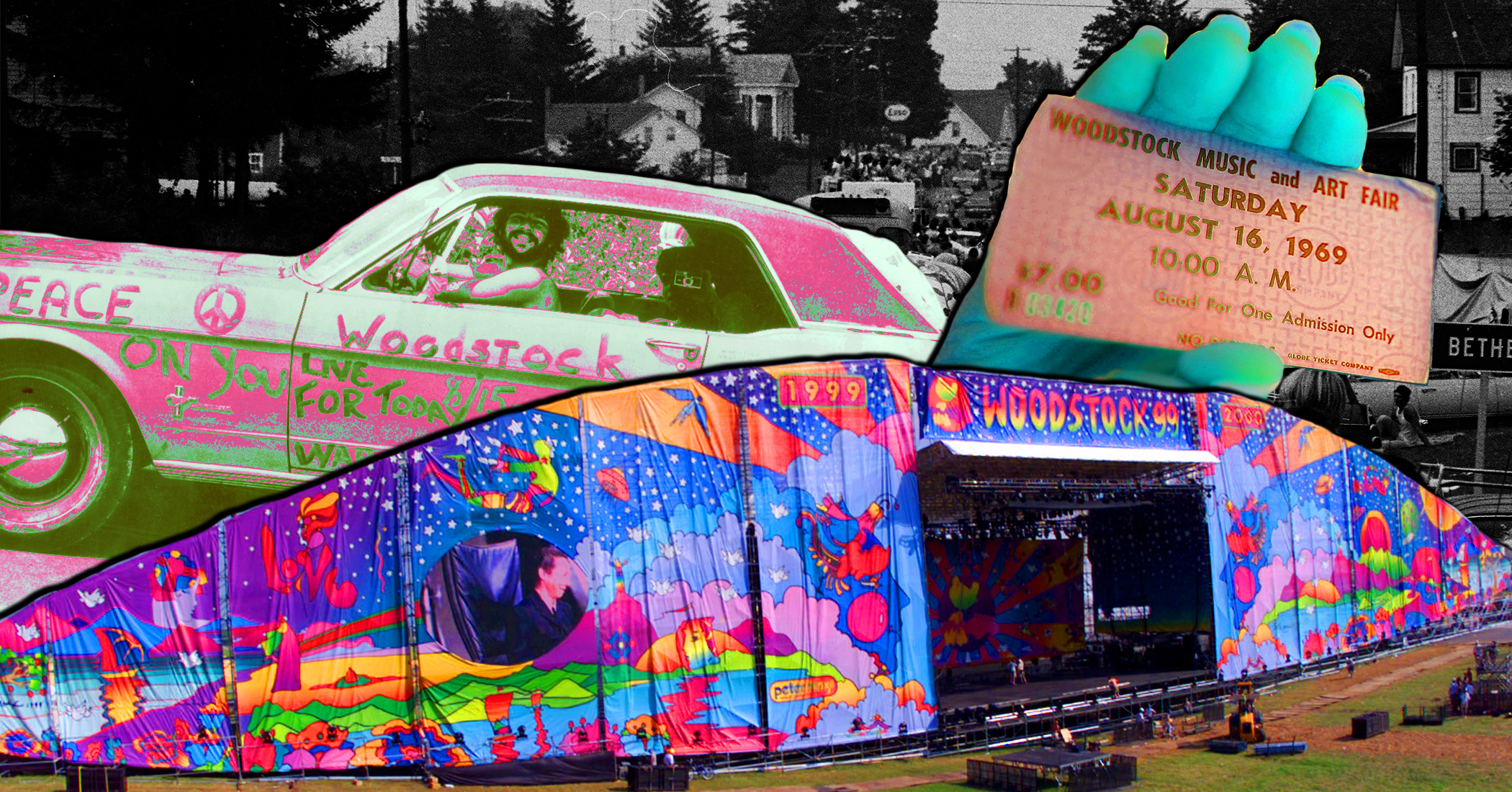A Gen Xer reckons with Woodstock ... again
How I learned to tune out the Boomer-nostalgia tour and appreciate Woodstock


A free daily email with the biggest news stories of the day – and the best features from TheWeek.com
You are now subscribed
Your newsletter sign-up was successful
I was born in September of 1970, almost exactly one year after Americans first walked on the moon, a year after "the Manson Family" killed Sharon Tate, and a year after Woodstock. I didn't live through any of those moments. And yet none of them has ever felt like ancient history to me, because by the time I was old enough to pay attention to television, radio, newspapers, and magazines, the Baby Boomers had begun taking over — and what they cared about, I was supposed to care about.
After being marginalized and even mocked by Eisenhower-era journalists and entertainers, Boomers (understandably) put their own spin on their generation's story and created a new cultural canon once they started taking over. I was raised on Bob Dylan and the Beatles, and the mythology of Woodstock. And a lot of it resonated with me ... at least at first.
With Woodstock, the novelty of all the 10th anniversary reflections in 1979 began to fade with the 15th, 20th, 30th ... and now, this year, the 50th.
The Week
Escape your echo chamber. Get the facts behind the news, plus analysis from multiple perspectives.

Sign up for The Week's Free Newsletters
From our morning news briefing to a weekly Good News Newsletter, get the best of The Week delivered directly to your inbox.
From our morning news briefing to a weekly Good News Newsletter, get the best of The Week delivered directly to your inbox.
I saw director Michael Wadleigh's Woodstock documentary for the first time when I was around 11 or 12 years old — and I loved it. The film played on our local PBS station, fairly late at night, with minimal edits. Creeping toward midnight, plopped in front of our tiny set, drifting off to sleep on our apartment's living room floor, I almost felt like I was fantasizing being Santana, Jimi Hendrix and Joe Cocker — not to mention all those happy hippies, who looked larger than life to my preteen self, like they'd stepped off a propaganda poster promoting communal living and classic rock.
But by the mid-to-late '80s, various conflicts and contradictions began troubling the Boomer generation, who were simultaneously benefiting from the plutocratic Reagan economy and feeling wistful about their more radical college years. This crisis of conscience manifested in movies and TV shows that reckoned with what had changed between 1969 and 1984. The Big Chill, The Wonder Years, and the spate of Vietnam films that followed in the wake of the Oscar-winning Platoon all turned a spotlight on the triumphs and failures of the Love Generation.
It's around then that the iconography of the Woodstock concert itself started becoming overfamiliar. All of these looks back at "the '60s" as a concept were relying on the same set of stock images: Soldiers in Vietnam; protest marches; go-go dancers in psychedelic paisley; and hundreds of thousands of young folks grooving on Max Yasgur's dairy farm in August of 1969. ("It was a time of peace ... and war," some narrator — most likely Peter Coyote — would gravely intone.)
The election of Bill Clinton as president in 1992 felt like the natural endpoint to those years of navel-gazing fascination with all things '60s. With his cool charisma, his progressive past, his willingness to compromise and his shaky morals, he was like The Big Chill in politician form.
A free daily email with the biggest news stories of the day – and the best features from TheWeek.com
But the Clinton era was also the moment when pop culture reoriented itself — however briefly — around my peers' interests. Nirvana and the rise of hip-hop broke radio open for a noisier, wilder kind of music that our Boomer parents hated. Quentin Tarantino made art-films hipper. Network television and cable TV alike became more youthful. (Hello, Friends!) The Woodstock era suddenly seemed more distant and less relevant.
When the Woodstock '94 concert rolled around, my generation had been spoiled by multiple Lollapalooza tours, and didn't necessarily need our own Woodstock. That same summer, one of the biggest movies was Forrest Gump. That film trafficked in the same kind of, "Hey man, remember the '60s?" nostalgia of the late '80s — complete with the same old shots of soldiers in Vietnam, inevitably set to Credence Clearwater Revival's "Fortunate Son." But Forrest Gump also captured some of the reactionary backlash that had been building up, depicting the hippie lifestyle as something spiritually unfulfilling and perhaps always unsustainable.
Something else happened in 1994, which started the process of Woodstock regaining some of its original mystique: Michael Wadleigh took advantage of the 25th anniversary of Woodstock to revisit and expand his documentary. As it turned out, the much-needed "fresh angle" on this whole event were literal fresh angles: new footage and performances that hadn't been widely seen before.
Over the course of the next 25 years, Wadleigh and the other stewards of Woodstock have continued to pull new material out of the vault. Some performers who'd refused to be a part of the earlier film and soundtrack — like the Grateful Dead and Credence Clearwater Revival — had a change of heart. Some songs that were cut from the movie resurfaced, with cleaned-up sound and imagery thanks to the technological advances of digital restoration.
The culmination of this "more Woodstock than you can handle" movement has been two commercial releases: a 2014 triple-disc Blu-ray edition of Wadleigh's Woodstock, now with nearly four hours of music that wasn't in the original 1970 film; and Rhino Records' new Back to the Garden: The Definitive 50th Anniversary Archive, a 38-disc, 36-hour, 432-song limited edition box set that's the most complete recording yet of the entire three-day concert.
Even during those long years of Woodstock fatigue, Wadleigh's documentary has remained a masterpiece. Skillfully assembled by a team of editors that included a young Martin Scorsese and Thelma Schoonmaker, the movie takes a loose approach to chronology, but mostly gets the real story right. It features interviews and montages that map out the mini-community which formed in and around Yasgur's farm, capturing the at-times unsettled, paranoid vibe of this place — and the sheer will it took for the weekend to proceed mostly peacefully.
I find this all very moving today, for reasons that may not make a lot of sense to those who've always bought into Woodstock as unassailably great. I started softening again on the concept of Woodstock once all the people who controlled the rights to the recordings moved beyond the fiery brilliance of Santana and Sly and the Family Stone, and began sharing some mediocre, bar-band-level performances by the likes of Mountain. The less-than-classic Woodstock outtakes make all these kids at the concert — musicians and fans alike — seem less like abstractions, and more like real, flawed human beings.
As I approach my 50th birthday, I find I relate to Woodstock less as something epochal, and more as a fascinating piece of American history, as messy as everything else that's made our country what it is today — for better and for worse. Lately, each time I revisit Wadleigh's Woodstock, I'm struck by how everyone in the film looks way too young and way too under-prepared for a cultural moment this tremendous. They're no longer "representatives of the hippie ideal" to me. They're children, playing in the mud and eating crackers with honey.
And the older I get, the younger they become.
Noel Murray is a freelance writer, living in Arkansas with his wife and two kids. He was one of the co-founders of the late, lamented movie/culture website The Dissolve, and his articles about film, TV, music, and comics currently appear regularly in The A.V. Club, Rolling Stone, Vulture, The Los Angeles Times, and The New York Times.
